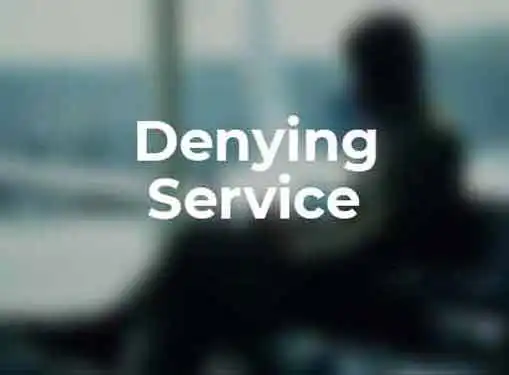Owning a Restaurant
Denying Service to Restaurant Customers
Customer service in restaurants gets tricky if a patron is drunk, unruly or is not wearing appropriate clothing. We discuss when restaurants can deny customers service and tell them to go somewhere else.
Can restaurant owners deny service to customers?

Not too long ago, a steakhouse owner in Louisville, Kentucky asked O.J. Simpson to leave his restaurant and later said "I didn't want to serve him because of my convictions of what he's done to those families."
Was this legal or illegal? In what instances can a restaurant decide not to serve a customer?
After the incident, O.J's lawyer said that his client's ejection was about race and that he intended to file a lawsuit and might go after the restaurant's liquor license.
One wonders whether the restaurant owner realized that he might be putting his restaurant at risk when he denied service to this high-profile customer.
Restaurant owners, take note. If you own a restaurant, it's important to understand the laws regarding denying service.
Generally speaking, restaurants are allowed to implement neutral patron conduct rules, dress codes or other neutral admission policies. Such policies must apply equally to all persons regardless of their race, color, sex, gender identity or other protected characteristics.
However, restaurants that have policies that adversely affect individuals based on specified protected classifications risk significant exposure under federal civil rights laws. The same is true if the restaurant does not apply their policies equally to all patrons.
Beyond that basic premise, the laws, and the case law, vary from state to state.
In California, for example, the Unruh Civil Rights Act, enacted in 1959, says that: "All persons within the jurisdiction of this state are free and equal, and no matter what their sex, race, color, religion, ancestry or national origin are entitled to the full and equal accommodations, advantages, facilities, privileges or services in all business establishments of every kind whatsoever."
In Stoumen v. Reilly, a case interpreting the Unruh Act, the appellate court wrote: "Members of the public of lawful age have a right to patronize a public restaurant and a bar so long as they are acting properly and are not committing illegal and immoral acts. The proprietor has no right to exclude or reject a patron except for good cause, and if he does so without good cause, he is liable in damages."
If you are not in California, you're probably wondering: What about my state?
You'll want to talk to a local lawyer to learn more about local statutes, regulations and judicial decisions affecting house rules and denial of service.
We've just covered the basics of denial of service laws for restaurants, and the rules can change at any moment. As such, you should always seek the advice of legal counsel when formulating your restaurant's house rules.
By the way, if you are wondering what happened with the O.J. Simpson denial of service incident, no lawsuit was filed for denial of service. In the end, O.J. and his attorney just decided to simply let the matter die.
Nonetheless, if you deny a customer service, there may be consequences. Always make sure you think things through thoroughly before deciding not to serve a customer and make sure you have witnesses to your actions so you are covered just in case the matter ever does end up in court.
Share this article
Additional Resources for Entrepreneurs



Conversation Board
Have you had any experiences regarding refusing to serve a customer that you'd care to share? Please leave your comments, tips and questions below.